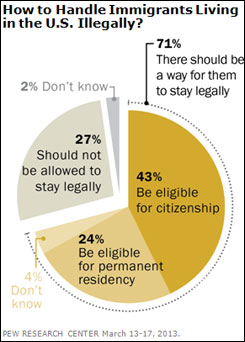The United States is known as a nation of immigrants, but throughout its history the country has been particular about who is allowed to enter. Immigration reform continues to be a thorny topic for citizens and policy experts — and especially Congress. Many believe that for reform, timing is everything. Understanding the patterns of both migration and public sentiment over time remain crucial.
According to recent Census data, approximately 40,378,000 American citizens were born outside the country. The Department of Homeland Security estimates that as of January 2011 about 13.1 million legal immigrants and 11.5 million unauthorized immigrants resided in the United States (the total U.S. population is estimated to be almost 325 million).
Net migration from Mexico was nearly zero — or even represented a net loss — according to a 2012 metastudy from the Pew Hispanic Research Center, while groups from other parts of the Americas are growing. After six years of decline in the numbers of non-Mexicans detained at the U.S. southern border, the rate doubled in 2012 (though it still remains far below its 2005 peak). New reports have focused on the extraordinary nature of many of these migrants’ journeys, notwithstanding legal and policy issues.
For more analysis on the data behind diverse immigration trends, see National Journal‘s “The Next America” project, which spotlights issues such as how metropolitan demographics are changing and how population shifts are shaping the political agenda.
 In the wake of the April 2013 Boston Marathon attack, some called for heightened security checks and a national citizen identity verification system. A March 2013 survey from Pew Research found that 43% of Americans supported a way for illegal immigrants to become citizens, 24% supported allowing illegal immigrants to become permanent residents, and 27% felt they should not be allowed to stay in the country. The survey also showed that over time, immigrants (both legal and unauthorized) have been viewed more positively over time: 49% of Americans believe that immigrants “strengthen the U.S. with their hard work and talents,” while 41% believe immigrants create “a burden because they take jobs and health care” resources.
In the wake of the April 2013 Boston Marathon attack, some called for heightened security checks and a national citizen identity verification system. A March 2013 survey from Pew Research found that 43% of Americans supported a way for illegal immigrants to become citizens, 24% supported allowing illegal immigrants to become permanent residents, and 27% felt they should not be allowed to stay in the country. The survey also showed that over time, immigrants (both legal and unauthorized) have been viewed more positively over time: 49% of Americans believe that immigrants “strengthen the U.S. with their hard work and talents,” while 41% believe immigrants create “a burden because they take jobs and health care” resources.
A second April 2013 poll, from Gallup, showed similar support for pathways to citizenship or residency for illegal immigrants but an even split over a proposed visa program that would allow a specific number of immigrants to work at “lesser skilled jobs.”
A 2013 metastudy published in Public Opinion Quarterly, “The Dynamics of Immigration Opinion in the United States, 1992-2012,” considers how the American public’s view of immigration has shifted over time. The author, political scientist Christopher P. Muste of the University of Montana, analyzed public opinion data over time on immigration levels, attitudes towards recent immigrants and public policy. The data analyzed came from the American National Election Studies, CBS/New York Times, Gallup, General Social Survey, Pew Research Center and Washington Post/ABC.
The study’s findings include:
- The author found “continuing negativity and ambivalence in immigration attitudes, tempered by a recent period of stability and increased moderation. Analyzing the combined data also reveals a pattern of rapid, steep increases in anti-immigrant sentiment in response to events such as the 1994 election, followed by declines over several years that stabilize at lower levels.”
- Most Americans do not support more immigration. Between 1994 and 2012, no more than 13% of respondents said that immigration rates should be increased, while those who thought that rates should be decreased ranged between 42% and 62%. Another survey by Gallup estimates that support for increased immigration has fluctuated between 7% and 21% since 1964; according to a 2010 poll, 13% favor more immigration while nearly half (49%) are opposed to an increase.
- Since 2001, a majority of Americans (between 52% and 67%) have said that immigration has a positive effect. A plurality since 2001 say that immigration contributes to the country (49%-57%) rather than causes problems (28%-31%).
- In 1994 and 2004, 45% of Americans reported that immigrants took jobs from Americans, but about one-half of respondents from 2001 to 2007 said that immigrants would not have much effect on job opportunities. The author notes a “stable and high level of job concern” related to immigration throughout the study period.
- The surveys analyzed presented diverging conclusions from the public as to how immigration is related to crime. A GSS survey showed that 25% of respondents believe immigrants increase crime rates; a 2007 Gallup poll showed that 58% said that immigrants make crime worse.
- “Opinion toward potential illegal immigrants outside U.S. borders is overwhelmingly negative. About 60% ‘strongly’ believe the government is ‘not doing enough’ to keep illegal immigrants out (2005 to 2010). Between 50% (in 2008) and 70% (in 2002, after 9/11) opined that spending on border security should be increased.”
“The effect of events does not neatly fit conventional wisdom,” the author concludes. “Economic problems in 1991-92, 2001, and 2008-10 did not increase opposition to immigration, but in the wake of rancorous debates over immigration policy in 1994-96 and 2006-07, and the events of 9/11, opinion on some issues became more negative.”
Tags: Hispanic, Latino

Expert Commentary